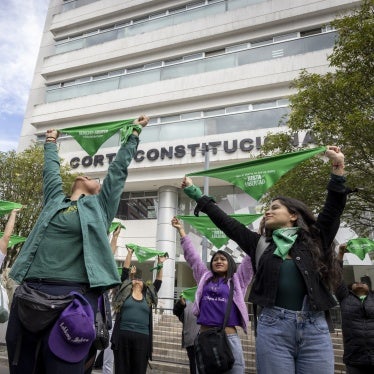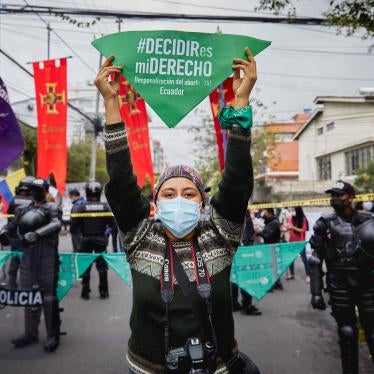(Washington, DC) – Ecuador’s National Assembly should decriminalize abortion in line with recommendations made by the United Nations, Human Rights Watch said today in a letter to the president of the assembly’s Justice Commission. In February 2015, the UN Committee on the Elimination of Discrimination Against Women urged Ecuador to decriminalize abortion in cases of rape, incest, and severe fetal impairment.
Ecuador’s criminal code prohibits abortion. The only exceptions are cases involving a threat to the life or health of a pregnant woman when the danger cannot be averted by other means and pregnancy resulting from the rape of a woman with a mental disability. All other women or girls, even those pregnant from a rape or with an unviable pregnancy, may not access a legal abortion and can be sentenced to up to two years in prison for having one. Even harsher penalties apply to medical professionals who perform abortions. The government of Ecuador recently stated that nearly 100 criminal cases for abortion are under investigation.
“Women should be able to seek medical care without fear that they’ll end up in jail,” said Liesl Gerntholtz, women’s rights director at Human Rights Watch. “The National Assembly shouldn’t tolerate a law that hurts rape victims and women facing the heartbreaking reality of an unviable pregnancy – it’s cruel and fails to respect women’s human rights.”
Ecuador’s abortion law leads some pregnant women and girls to seek clandestine and unsafe abortions, putting their lives and health at risk. Abortion is the second leading cause of female morbidity – disease, disability, or physical harm – and a significant cause of maternal mortality in Ecuador.
In 2013, the National Assembly debated reforms to the criminal provisions related to abortion, and voted to change antiquated language related to women with disabilities. But it did not approve changes that would allow all pregnant victims of rape or women and girls with unviable pregnancies to get abortions without fear of prosecution.
Human Rights Watch documented the impact of Ecuador’s abortion law on rape survivors and found, in a 2013 report, that the law results in doctors refusing treatment to pregnant victims who seek safe abortions. Some doctors told Human Rights Watch that they had denied comprehensive post-abortion care to rape survivors as young as 12 because the law prohibited them from providing abortion services.








